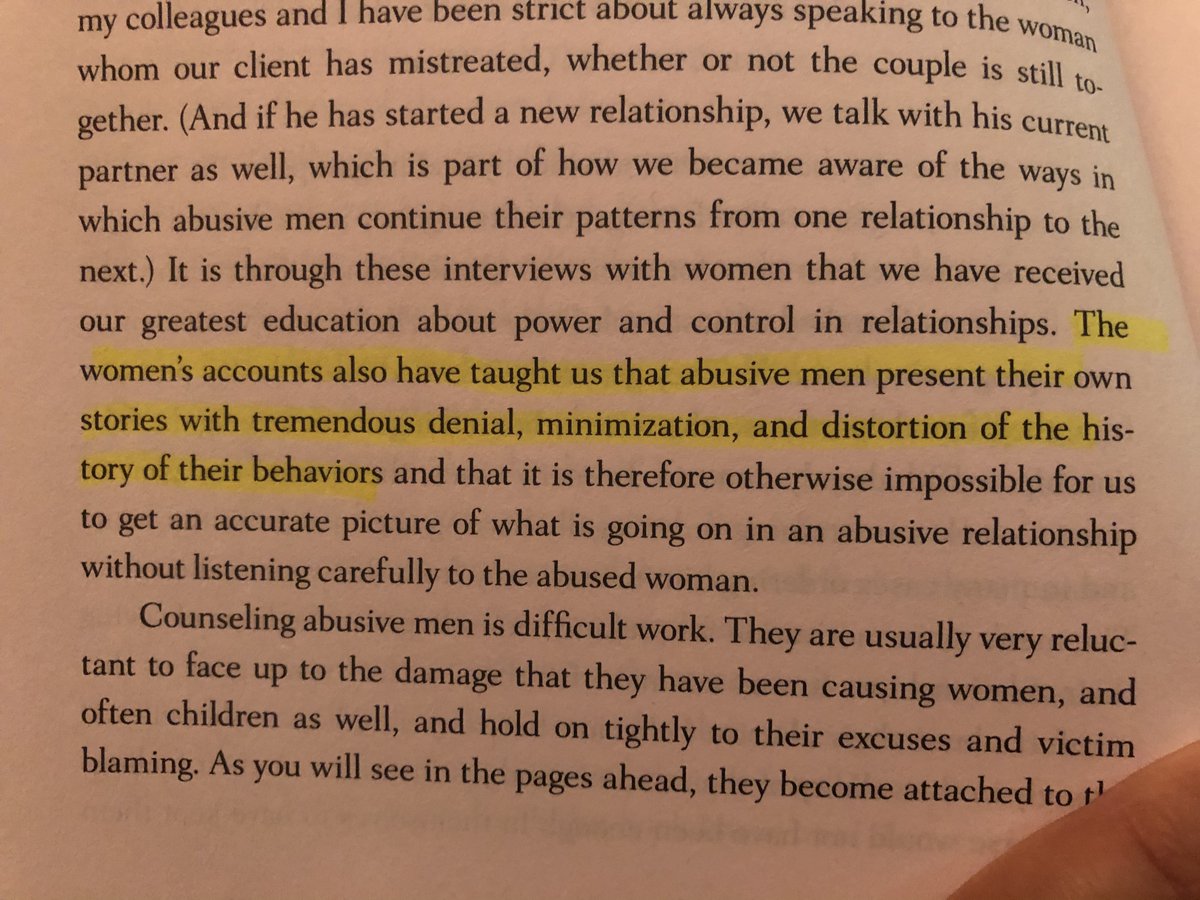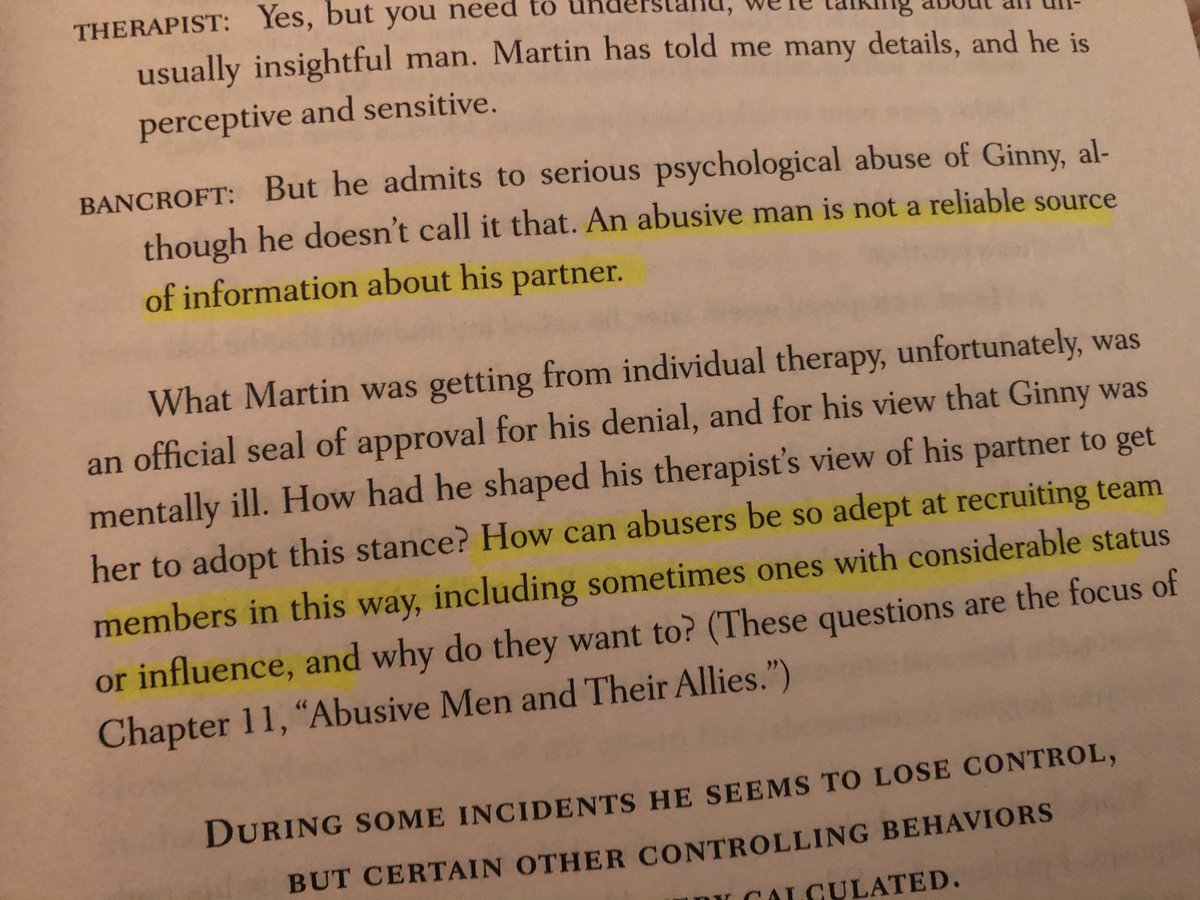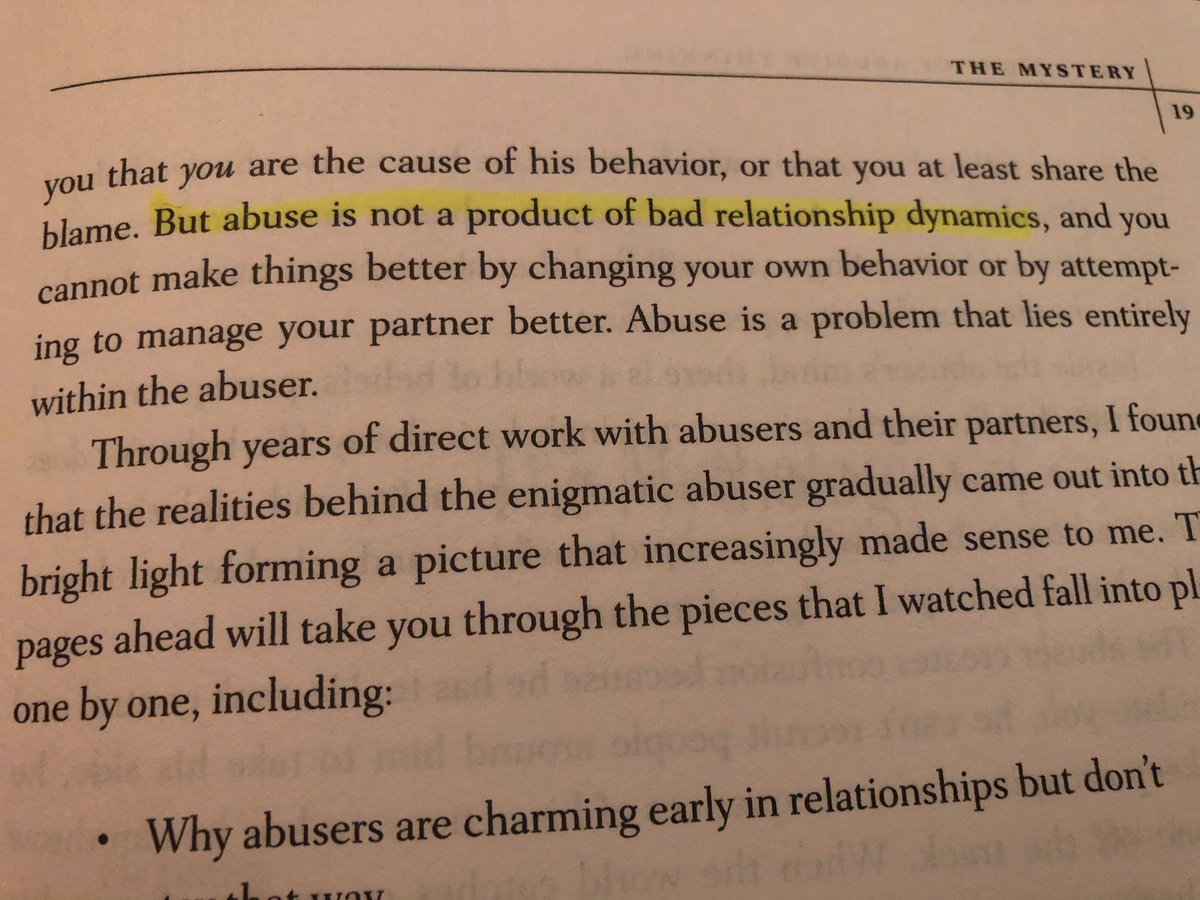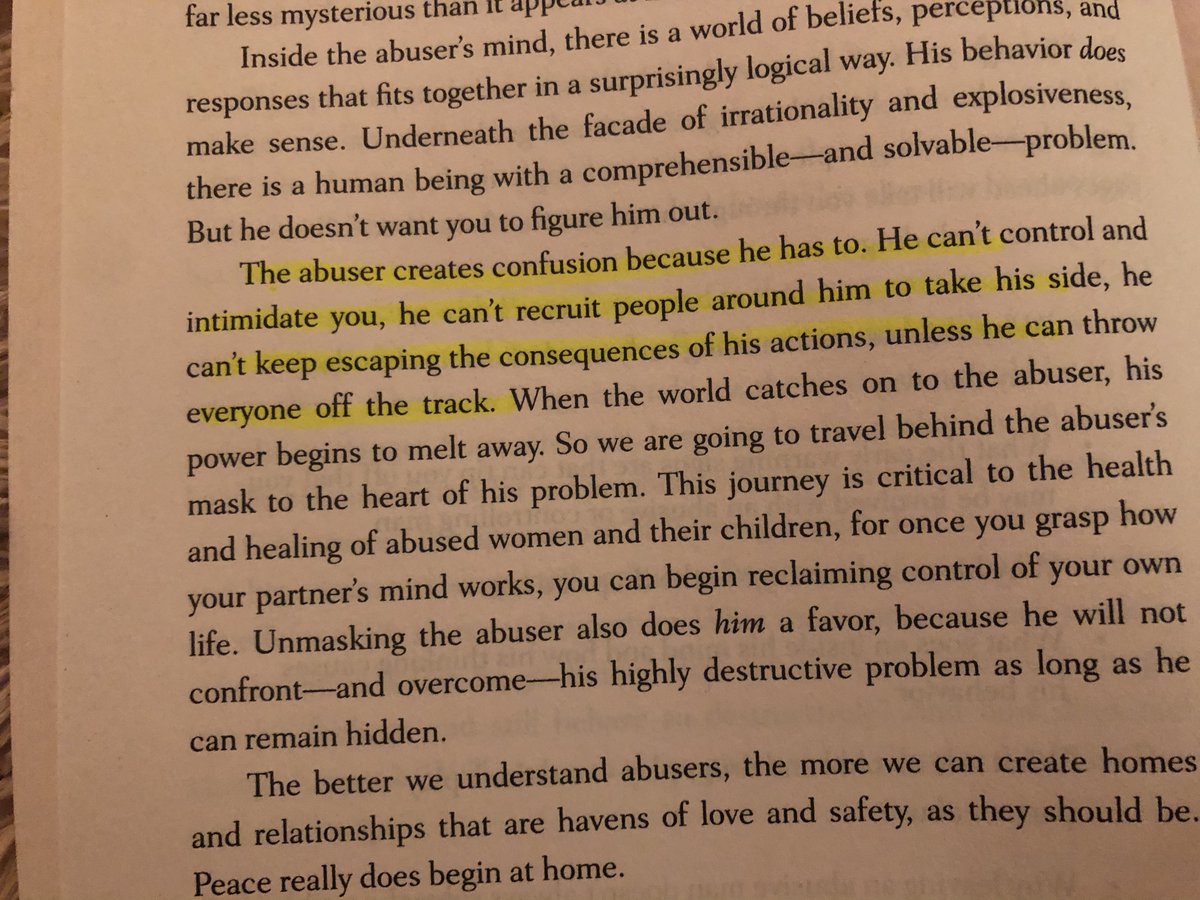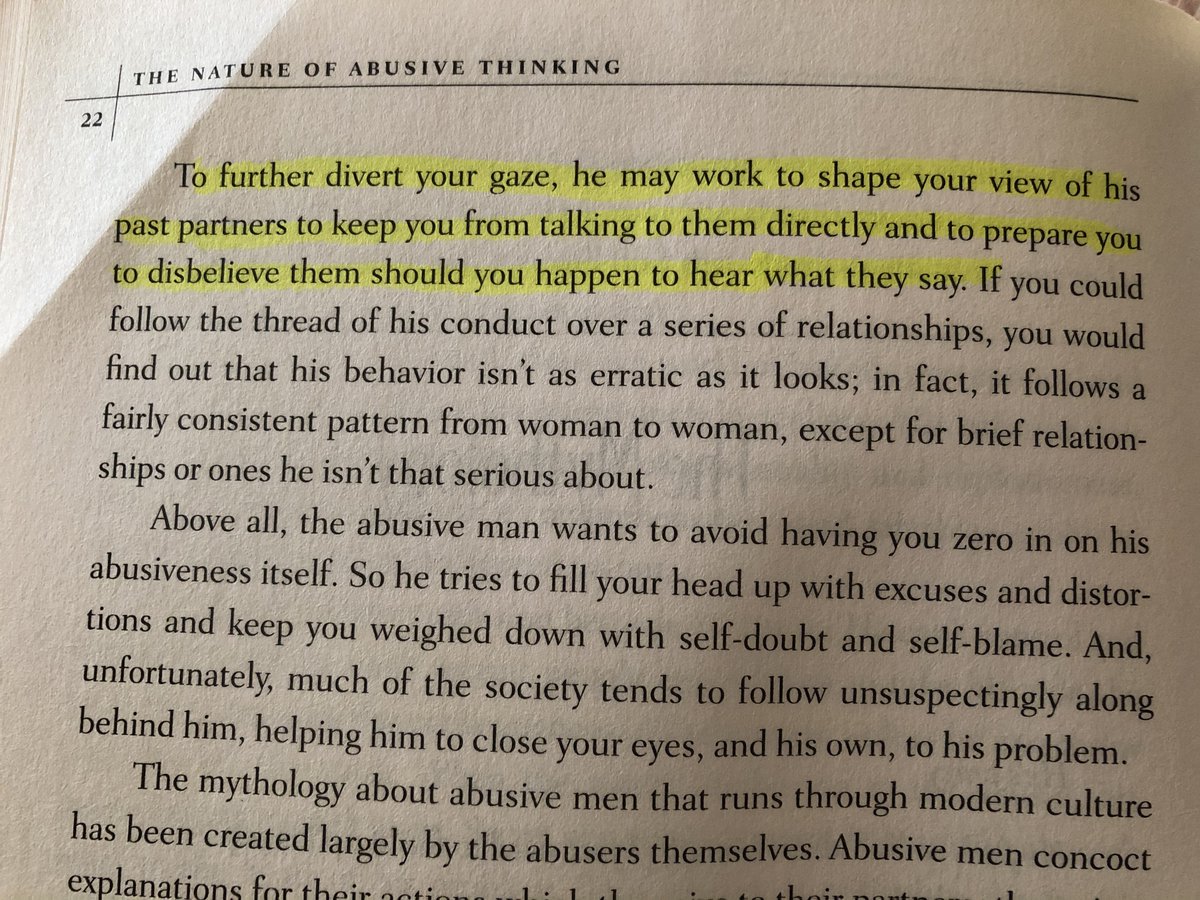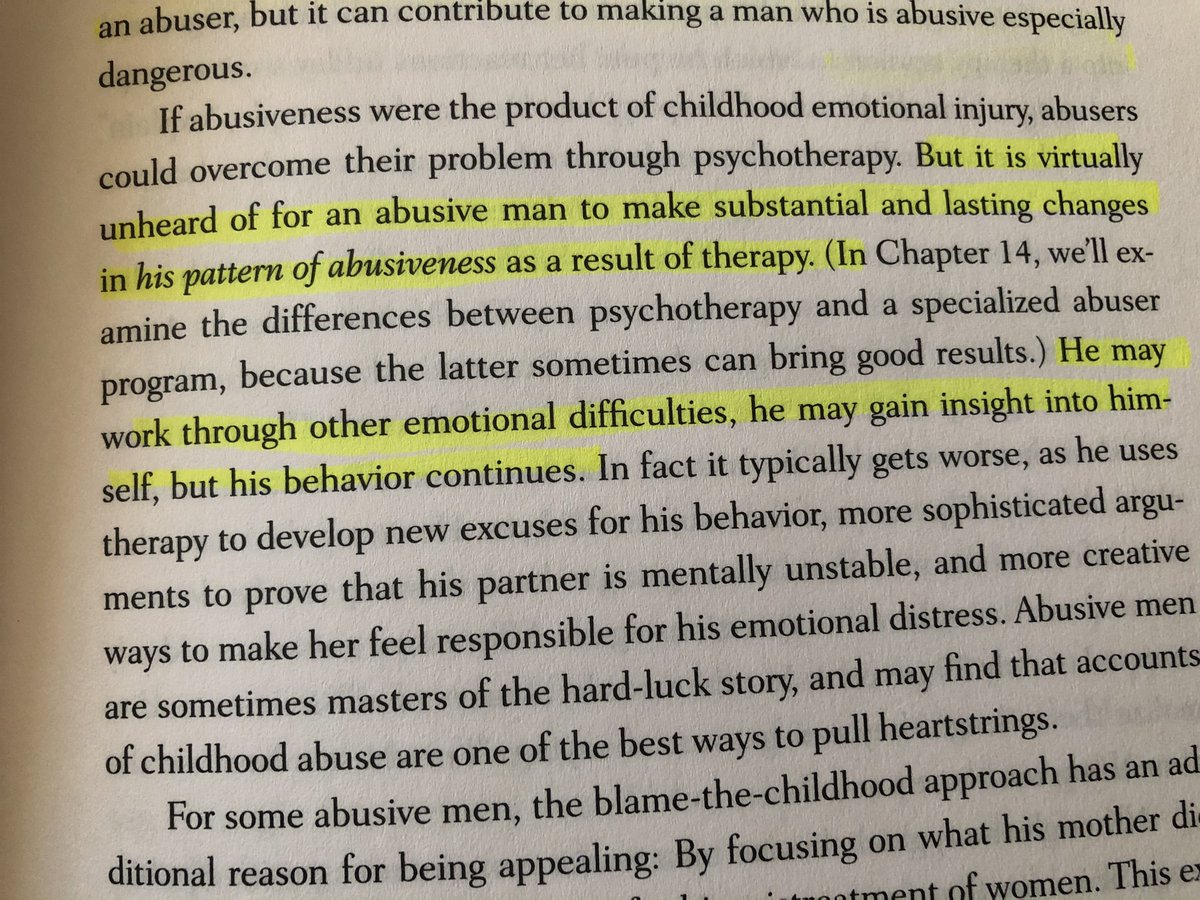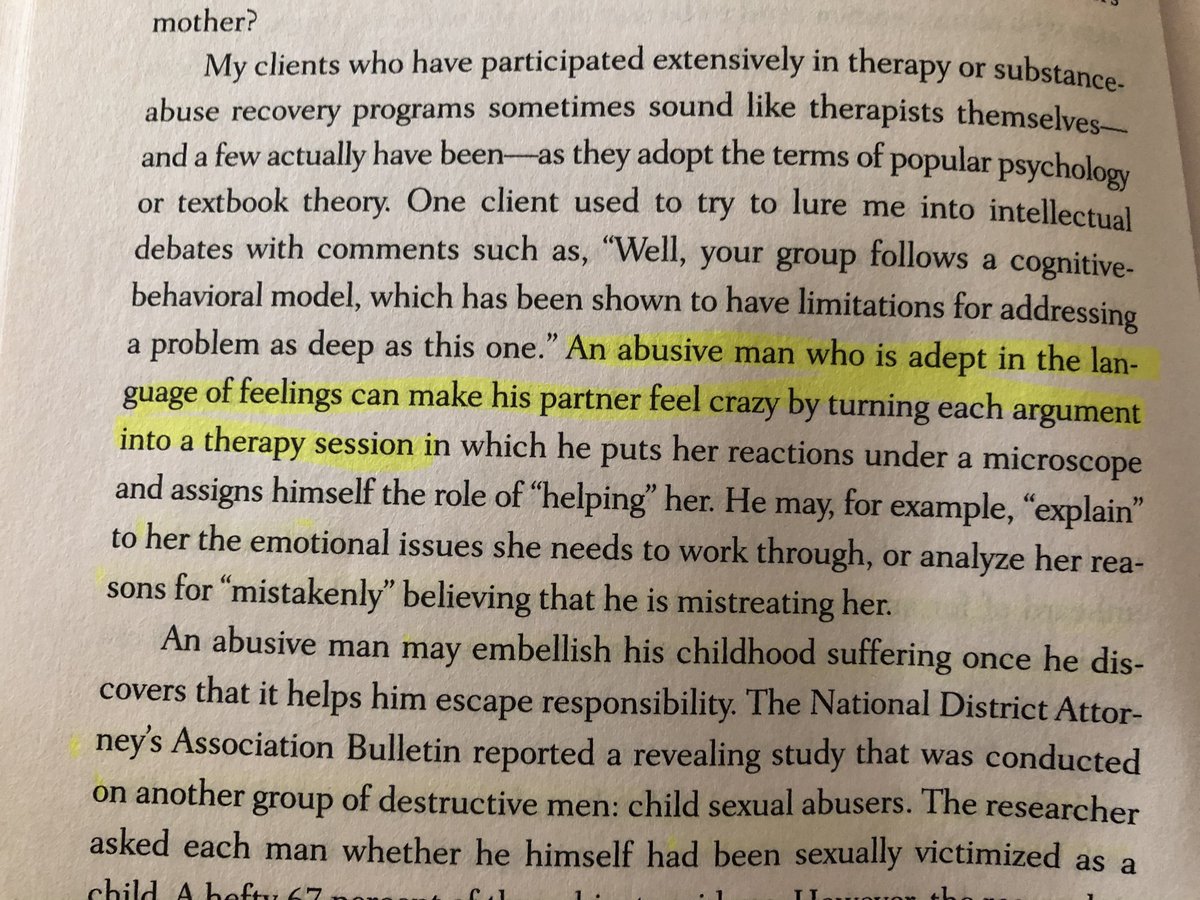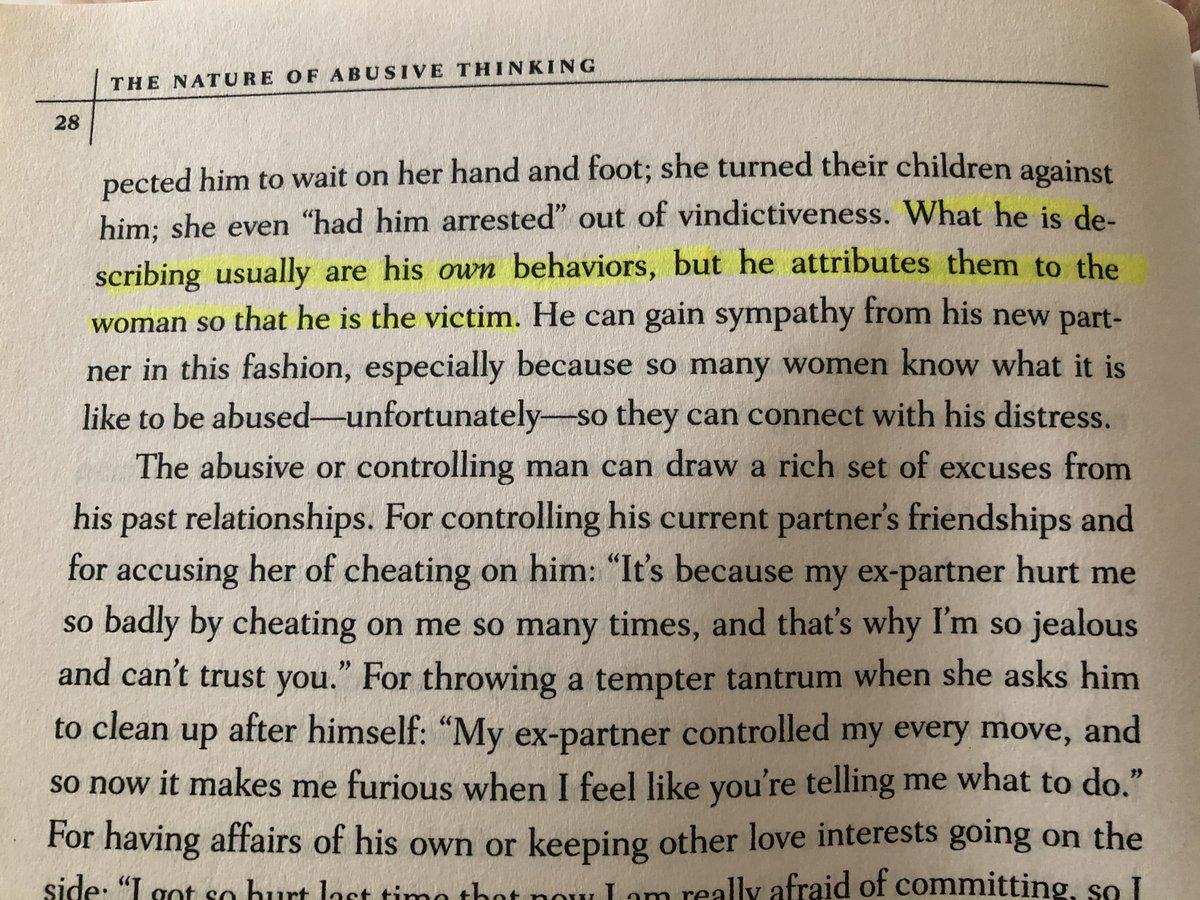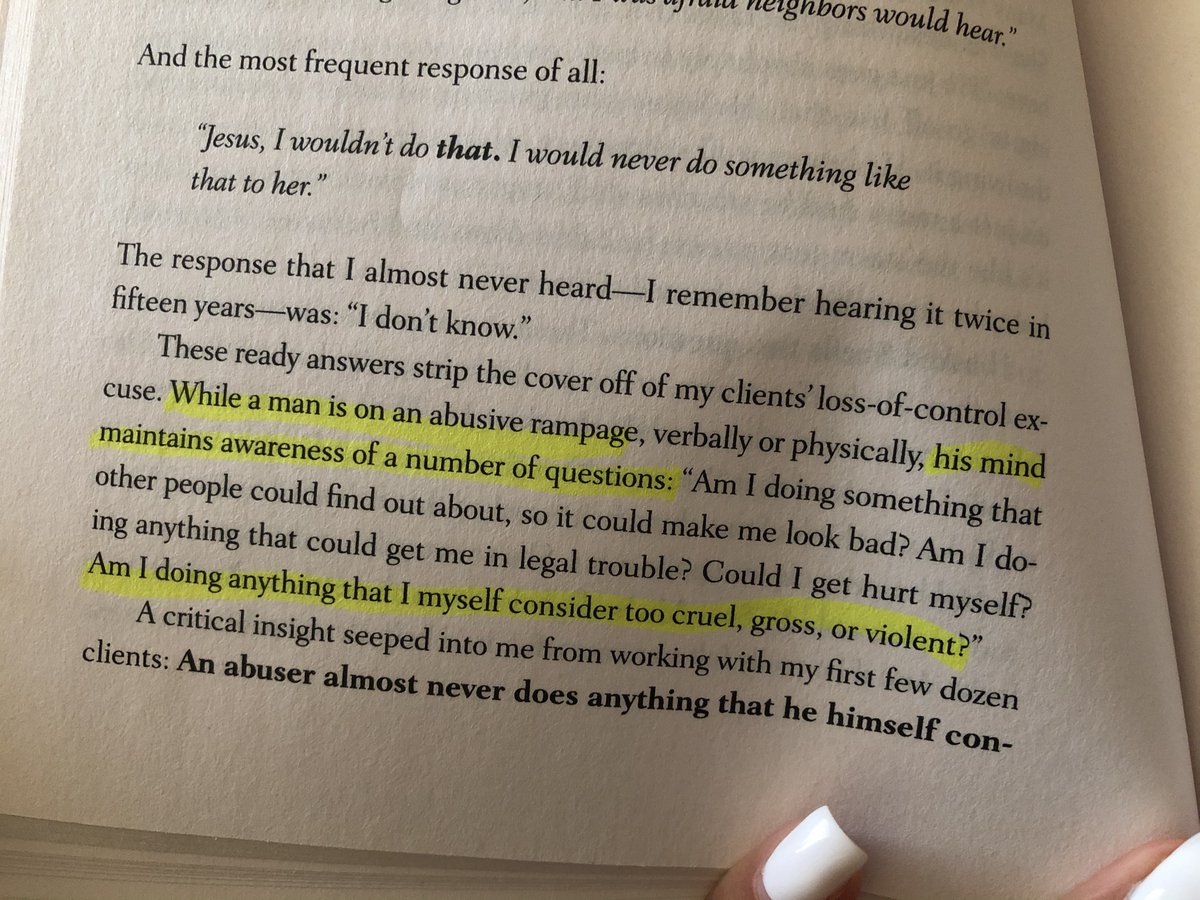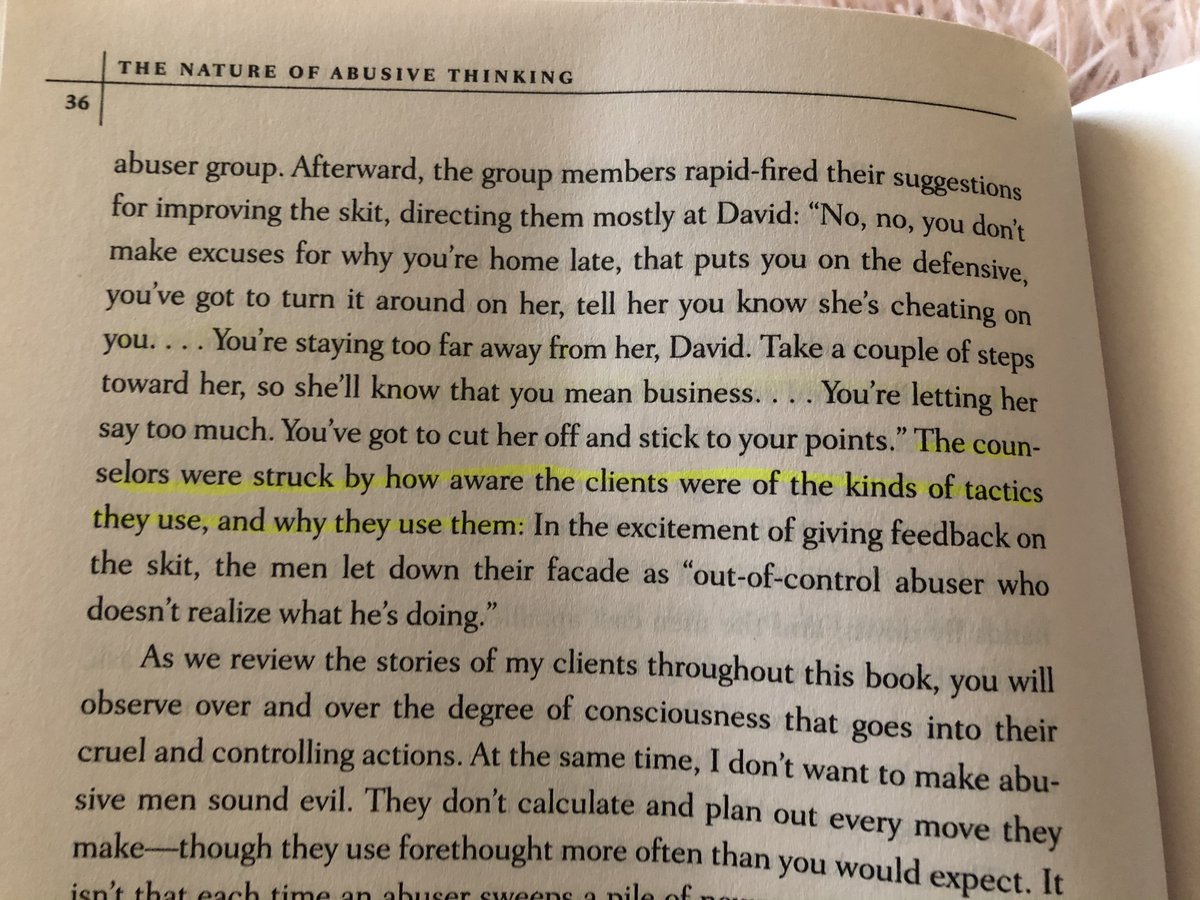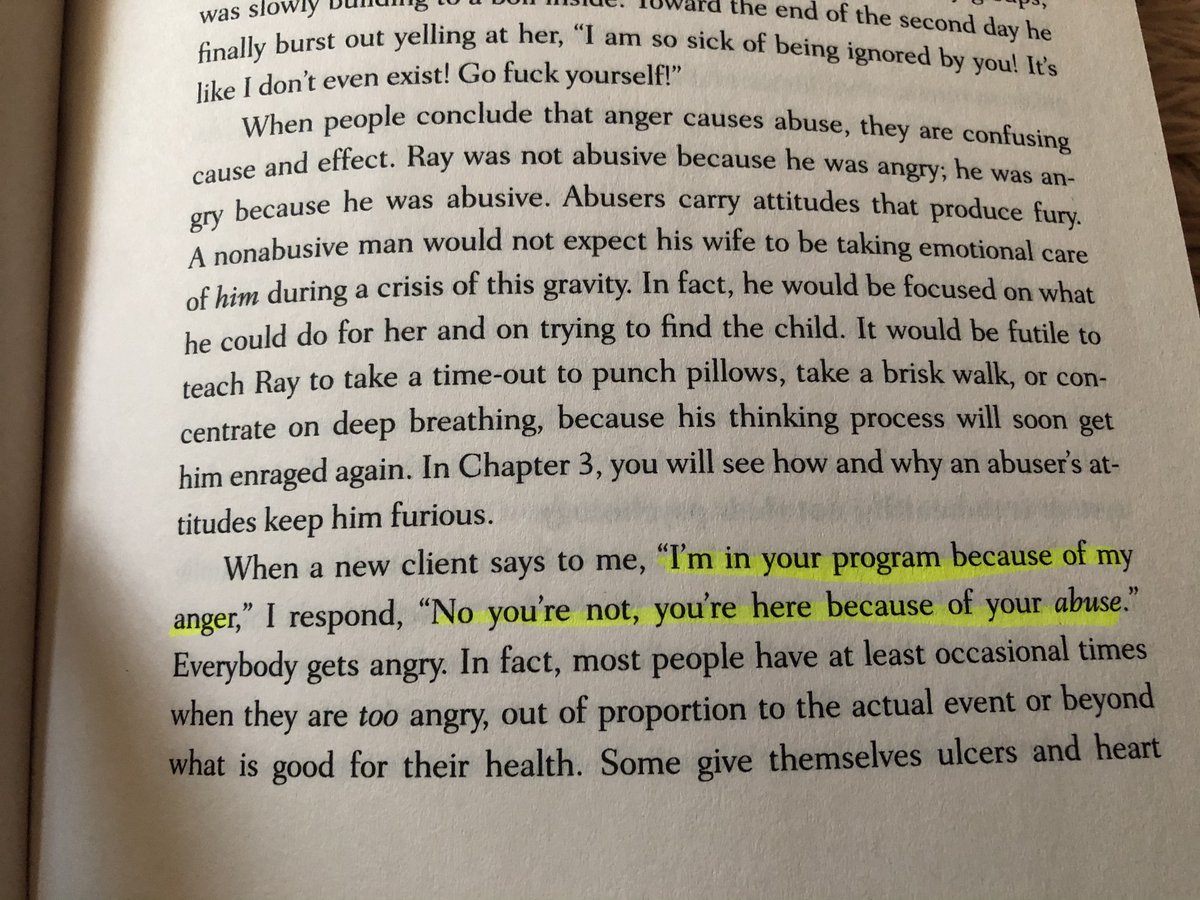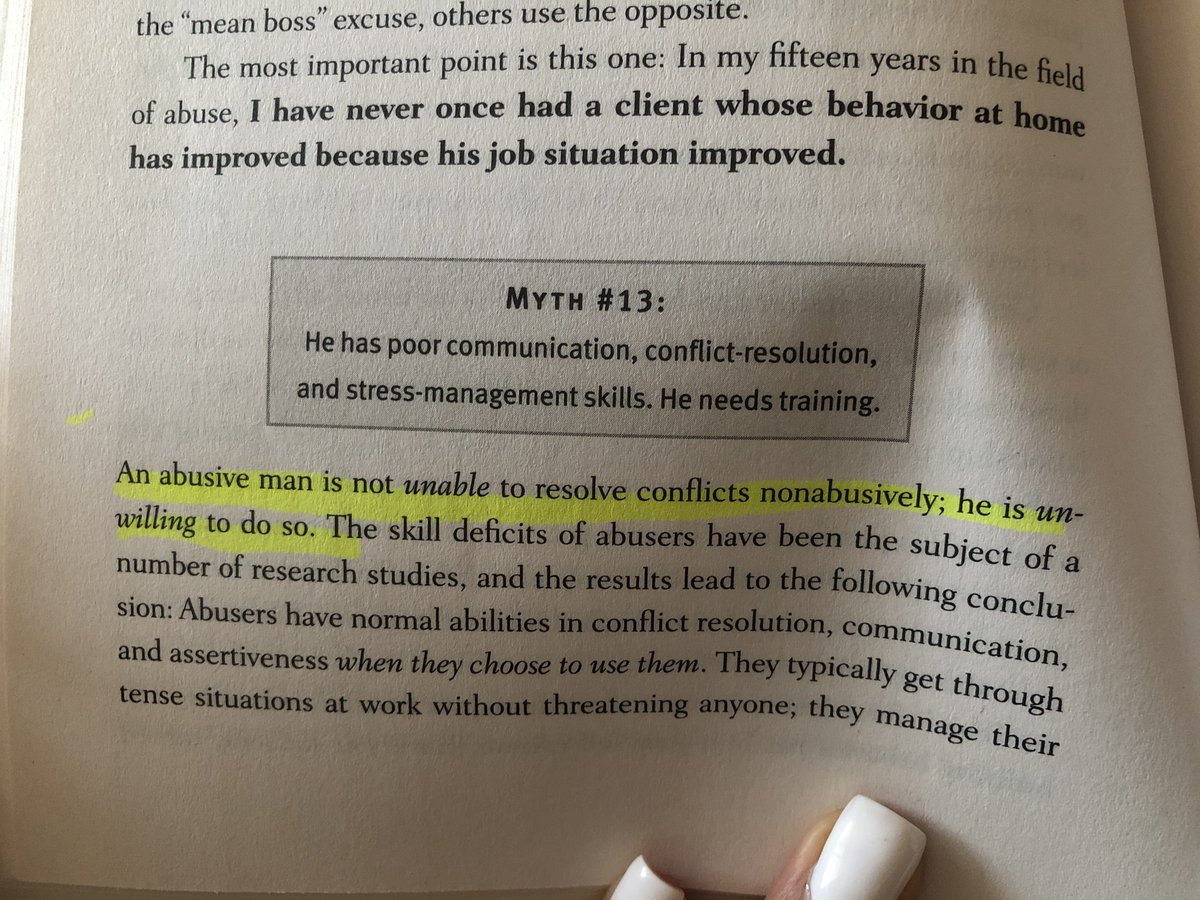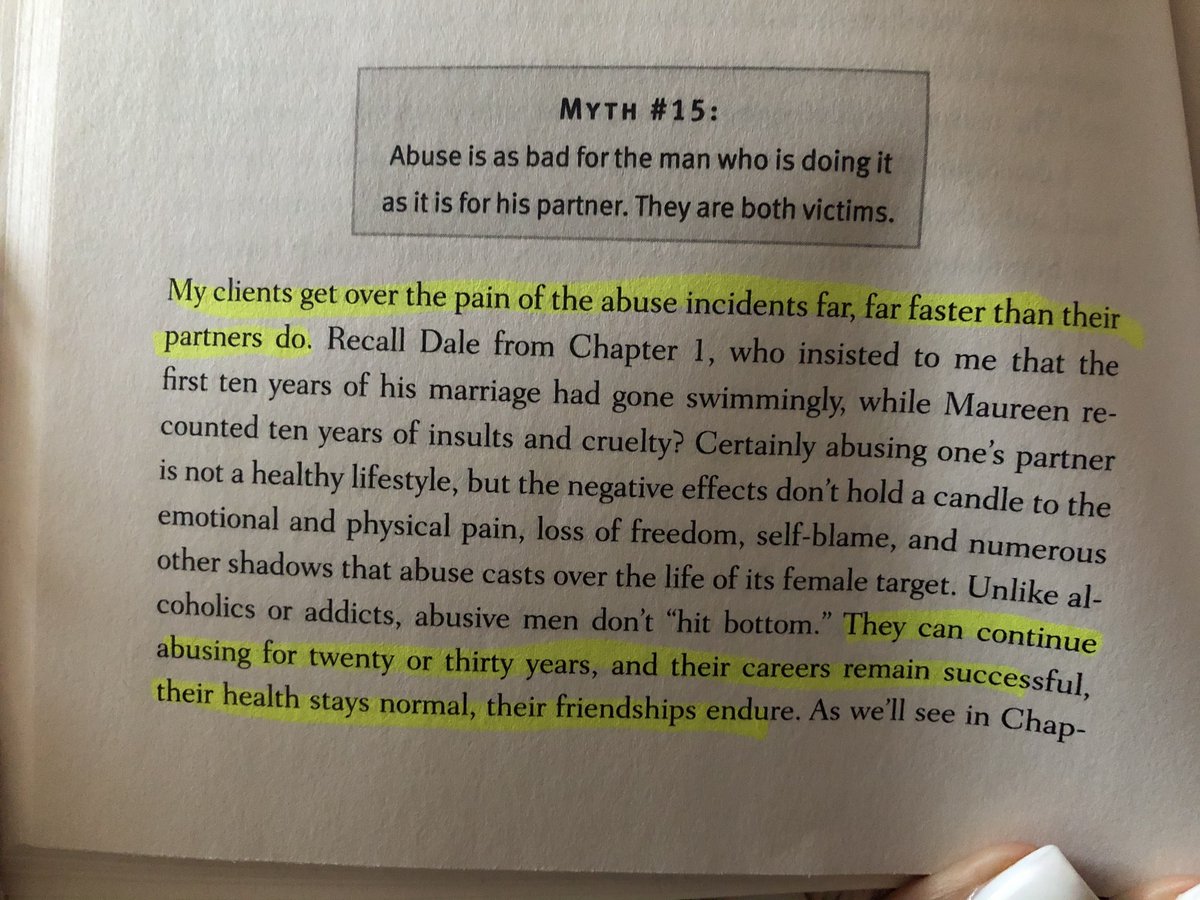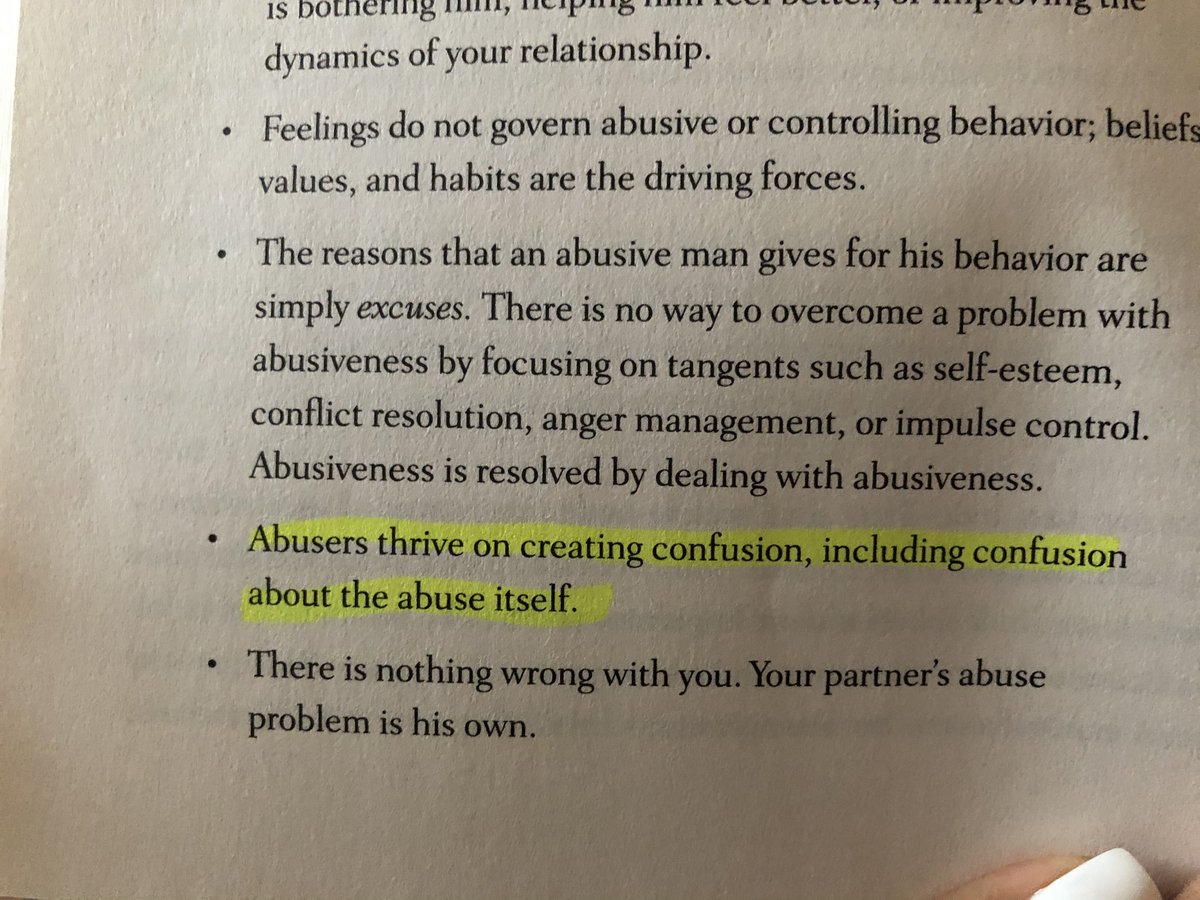TW// abuse
Super excited to read "Why Does He Do That?" Bancroft, the author, worked with abusive men for over 20 years.
The book explores exactly what the title says - why abusers abuse.
I& #39;m going to live tweet over the next few months as I read along https://abs.twimg.com/emoji/v2/... draggable="false" alt="🙃" title="Auf den Kopf gestelltes Gesicht" aria-label="Emoji: Auf den Kopf gestelltes Gesicht">
https://abs.twimg.com/emoji/v2/... draggable="false" alt="🙃" title="Auf den Kopf gestelltes Gesicht" aria-label="Emoji: Auf den Kopf gestelltes Gesicht">
Super excited to read "Why Does He Do That?" Bancroft, the author, worked with abusive men for over 20 years.
The book explores exactly what the title says - why abusers abuse.
I& #39;m going to live tweet over the next few months as I read along
So, I read chapter 1 tonight. Bancroft briefly outlines what the book will be about and covers a few common questions partners of abusers typically ask.
Here, he discusses how important it is to speak directly to *partners* of abusers TO GET THE ACCURATE STORY.
Here, he discusses how important it is to speak directly to *partners* of abusers TO GET THE ACCURATE STORY.
"An abuser is not a reliable source of information about their partner."
Beyond details of the abuse, abusers tend to lie about who their victims are. What kind of people they are. How they show up. Their behavior.
It& #39;s necessary to build their ecosystem. To manipulate others.
Beyond details of the abuse, abusers tend to lie about who their victims are. What kind of people they are. How they show up. Their behavior.
It& #39;s necessary to build their ecosystem. To manipulate others.
Bitterness? Revenge? Displaced blame?
Convincing you and others that the survivor is the problem is how they escape confronting themselves and evade accountability.
"Abuse is a problem that lies entirely within the abuser."
Convincing you and others that the survivor is the problem is how they escape confronting themselves and evade accountability.
"Abuse is a problem that lies entirely within the abuser."
Ch. 1 entitled "The Mystery" ends discussing that abusers, in fact, are not a mystery at all. Nor is their behavior erratic to them.
It& #39;s strategic. Intentional. Necessary.
"One of the obstacles of recognizing ... is that most abusive people simply don& #39;t *seem* like abusers."
It& #39;s strategic. Intentional. Necessary.
"One of the obstacles of recognizing ... is that most abusive people simply don& #39;t *seem* like abusers."
Feel free to read along with me  https://abs.twimg.com/emoji/v2/... draggable="false" alt="💙" title="Blaues Herz" aria-label="Emoji: Blaues Herz">
https://abs.twimg.com/emoji/v2/... draggable="false" alt="💙" title="Blaues Herz" aria-label="Emoji: Blaues Herz">
I’ll be reading chapter 2 today and posting about it tonight!!
I’ll be reading chapter 2 today and posting about it tonight!!
Chapter 2 looks at "The Mythology" i.e. the things we culturally, collectively, etc. believe about abusers that are actually false.
A few of these myths include:
- they were abused as a child
- they lose control
- they hate women
- they have poor communication skills
A few of these myths include:
- they were abused as a child
- they lose control
- they hate women
- they have poor communication skills
To kick off the chapter, Bancroft discusses how abusers work as magicians to confuse and distract you - including how abusers lie about past (or current) partners to manipulate you into thinking they are untrustworthy in case they speak out about their abuse.
Question #1: is it because he was abused as a child?
Answer: No. Many of us were abused as children & we *do not become abusers*
Further, Bancroft speaks to the unlikelihood that abusers will transform via therapy. Rather, they& #39;ll use the language they learn to their advantage.
Answer: No. Many of us were abused as children & we *do not become abusers*
Further, Bancroft speaks to the unlikelihood that abusers will transform via therapy. Rather, they& #39;ll use the language they learn to their advantage.
Abusers who seek counseling (for whatever reason, in this case for childhood abuse) use therapeutic skills/knowledge to sharpen their abuse.
We see similar examples when abusers in organizing spaces use feminist language, for example, to minimize, distort, manipulate, etc.
We see similar examples when abusers in organizing spaces use feminist language, for example, to minimize, distort, manipulate, etc.
Myth #2: He had a previous partner who mistreated him and now he has a problem with women, in general.
Bancroft discusses how abusers describe their past relationships and the behaviors of ex& #39;s - often, their descriptions are actually projections of their own behavior.
Bancroft discusses how abusers describe their past relationships and the behaviors of ex& #39;s - often, their descriptions are actually projections of their own behavior.
Myth #3: he loses control
"You called her a whore and shoved her to the ground. There she was at your feet where it would have been easy to kick her. What stopped you?"
An abuser almost never does anything he considers morally unacceptable.
"You called her a whore and shoved her to the ground. There she was at your feet where it would have been easy to kick her. What stopped you?"
An abuser almost never does anything he considers morally unacceptable.
This section was so interesting/important. Bancroft explains that every abuser has their own set of values in the realm of their abuse to justify their actions.
They are aware of their actions; in no way are they "out of control." They know what they can/can& #39;t get a way with.
They are aware of their actions; in no way are they "out of control." They know what they can/can& #39;t get a way with.
Bancroft was preparing a skit for a conference and the abuser group watched. They commented on what needed to be changed, based on their own abusive tactics.
ABUSERS ARE STRATEGIC AND INTENTIONAL.
ABUSERS ARE STRATEGIC AND INTENTIONAL.
Myth #7: He& #39;s too angry, he needs anger management
Everyone experiences anger and rage. Most of us are not abusers.
"You& #39;re not abusive because you& #39;re angry. You& #39;re angry because you& #39;re abusive."
Everyone experiences anger and rage. Most of us are not abusers.
"You& #39;re not abusive because you& #39;re angry. You& #39;re angry because you& #39;re abusive."
Further, Bancroft goes on to explain that, "perhaps their loudest most intimidating forms of abuse come out when they& #39;re angry but their deeper pattern is operating all the time."
i.e. coercion, jealousy, possessiveness, etc.
i.e. coercion, jealousy, possessiveness, etc.
Myth #13: Poor communication or conflict resolution
It ain& #39;t that, sis. No matter how much you sit with an abuser to discuss communication styles or tips for navigating conflict, it doesn& #39;t matter.
An abuser is not unable, they are unwilling.
It ain& #39;t that, sis. No matter how much you sit with an abuser to discuss communication styles or tips for navigating conflict, it doesn& #39;t matter.
An abuser is not unable, they are unwilling.
We speak a lot about the impacts of abuse on survivors and how abusers seem to carry on with life, uninterrupted. Their career remains the same. There& #39;s no pause in production. No major loss of support.
"Abusers tend to benefit from their controlling behaviors."
"Abusers tend to benefit from their controlling behaviors."
To end the chapter, Bancroft offers a summary of all the myths.
He includes a reminder that abusers love the circus. They love the mess. The confusion is a necessary tactic - we know they cannot afford to have people focus on the truth.
He includes a reminder that abusers love the circus. They love the mess. The confusion is a necessary tactic - we know they cannot afford to have people focus on the truth.
Here’s a free copy of the book if you’d like to read along with me. I’m only on chapter 2!  https://abs.twimg.com/emoji/v2/... draggable="false" alt="💙" title="Blaues Herz" aria-label="Emoji: Blaues Herz">
https://abs.twimg.com/emoji/v2/... draggable="false" alt="💙" title="Blaues Herz" aria-label="Emoji: Blaues Herz">
https://twitter.com/spicylighter/status/1293705776712712192?s=21">https://twitter.com/spicyligh... https://twitter.com/spicylighter/status/1293705776712712192">https://twitter.com/spicyligh...
https://twitter.com/spicylighter/status/1293705776712712192?s=21">https://twitter.com/spicyligh... https://twitter.com/spicylighter/status/1293705776712712192">https://twitter.com/spicyligh...

 Read on Twitter
Read on Twitter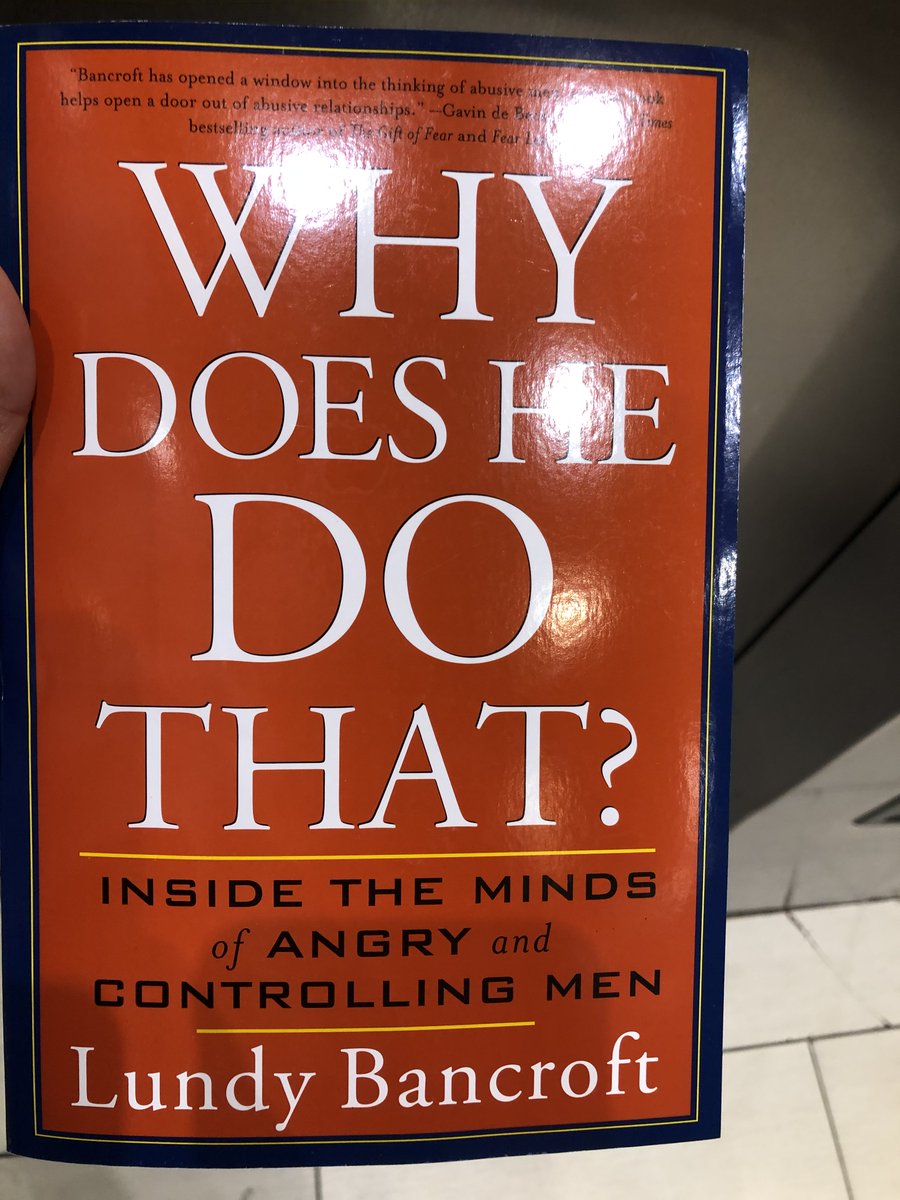 " title="TW// abuseSuper excited to read "Why Does He Do That?" Bancroft, the author, worked with abusive men for over 20 years.The book explores exactly what the title says - why abusers abuse.I& #39;m going to live tweet over the next few months as I read along https://abs.twimg.com/emoji/v2/... draggable="false" alt="🙃" title="Auf den Kopf gestelltes Gesicht" aria-label="Emoji: Auf den Kopf gestelltes Gesicht">" class="img-responsive" style="max-width:100%;"/>
" title="TW// abuseSuper excited to read "Why Does He Do That?" Bancroft, the author, worked with abusive men for over 20 years.The book explores exactly what the title says - why abusers abuse.I& #39;m going to live tweet over the next few months as I read along https://abs.twimg.com/emoji/v2/... draggable="false" alt="🙃" title="Auf den Kopf gestelltes Gesicht" aria-label="Emoji: Auf den Kopf gestelltes Gesicht">" class="img-responsive" style="max-width:100%;"/>
